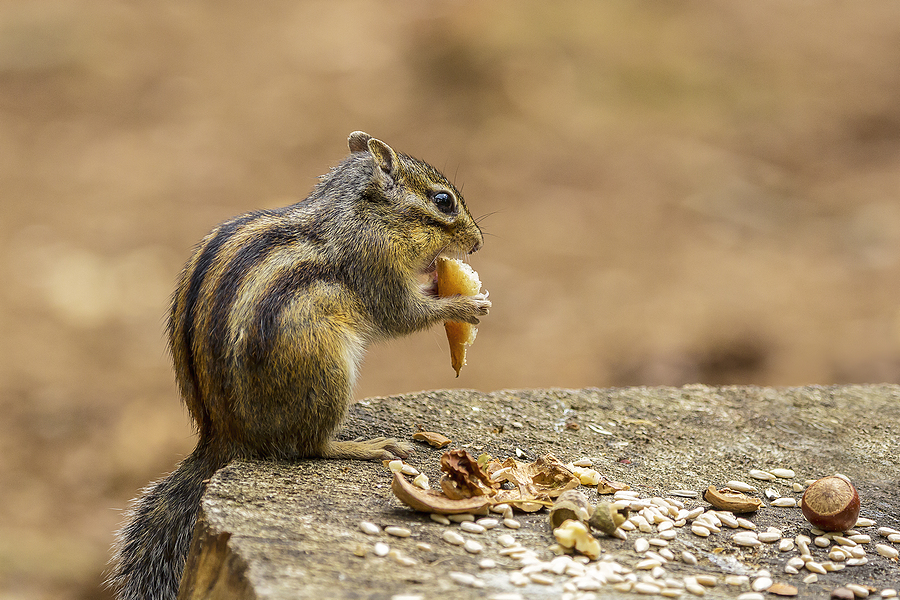Chipmunks are hard to dislike. Not only are they one of the most adorable, furry little critters you see in Indiana, they are also one of the most entertaining to watch play and hop around. However adorable, chipmunks can also be little troublemakers. They love to munch on seeds, nuts, fruits, berries, and even dig up plants to eat their roots, all of which make overgrown gardens and lawns a prime target this time of year. If you are having trouble with nuisance chipmunks, it may help to familiarize yourself with some of their common behaviors and habits in order to find a solution to the problem.
Continue reading to learn some useful and interesting facts about chipmunks, including what you can do to put a stop to their destruction.

Interesting Chipmunk Facts That You Can Share
🐿 Chipmunks are Rodents
Technically, a chipmunk is a rodent, as they are part of the Rodentia order. They are also mammals, of the family Sciuridae, just like squirrels, prairie digs, and marmots. There are 25 known species of chipmunk, one of which is not native to North America.
🐿 Chipmunks are Omnivores
They eat an omnivorous diet, just like humans. They commonly dine on fruits, nuts, seeds, cultivated grains, vegetables, fungi, insects, arthropods (spiders, butterflies, scorpions, crustaceans, Etc.), and sometimes even small amphibians like tree frogs. Chipmunks have large cheek pouches that they use to stuff full of food they find, then they bring it all back to their underground burrows where they store their food for the winter. They mostly forage on the ground, but will also climb trees to get acorns and fruit.
🐿 Chipmunks Love Their “Me” Time
Did you know that chipmunks are actually loners? Although more than one chipmunk family can reside in the same burrow, they travel alone and basically ignore all other chipmunks around them until mating season starts up again in spring. This is good news for homeowners with a chipmunk infestation in the attic. Most often, it is just one lone chipmunk, which does a lot less damage than an entire colony of squirrels. However, females can give birth to litters of 8 or more, so an infestation can be larger if it is a nursing female.
🐿 Chipmunks are Mostly Subterranean
Chipmunks live in underground burrows that they dig themselves, which usually consist of an elaborate network of tunnels that can extend up to 11 feet in length. They keep their sleeping area clean, while keeping waste and droppings in another area. The entrances to their burrows are well-concealed, and usually only detectable by a trained eye.
🐿 Chipmunks Hibernate
Chipmunks hibernate. They fill their burrows up with as much food as possible in late summer and fall in order to have enough provisions for the winter. Aside from hibernation, chipmunks sleep an average of 15 hours a day, mostly because they do not have to stay on alert for predators since they live underground.
🐿 Chipmunks Have a Quick Life
Unfortunately, chipmunks do not live for a very long time. In the wild, their average lifespan is between 2 and 3 years. In captivity, they can live a little longer, up to 6 or 7 years with strict owner commitment. This is usually most common at licensed wildlife rehabilitation facilities.
If you have a nuisance wildlife problem, your best course of action would be to request professional advice from a licensed Indianapolis wildlife control company. They have the training, experience, and knowledge to give you helpful advice or service.
Affordable Wildlife Removal and Control in Central Indiana
Call Modern Wildlife Control at 317-847-6409 to solve your nuisance animal problems with chipmunks at a price you can afford. Our DNR licensed and insured animal rescue and removal professionals offer non-lethal wildlife control services in Indianapolis, Indiana and its surrounding counties. We work with all types of wildlife, but specialize in raccoons, bats, birds, and squirrels. We also offer cleanup services and restoration and repair for animal damages, and can even provide insurance claim work. Start with a free estimate or advice, today!

